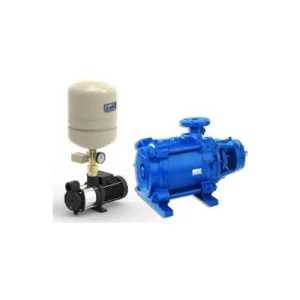Learn about pressure pumps, their features, benefits, and applications. Ideal for water supply, cleaning systems, HVAC, and industrial operations.

Whether for household use, commercial operations, or industrial systems, pressure pumps play a vital role in ensuring steady water flow and reliable fluid transfer. From boosting low water pressure to powering irrigation systems, these pumps provide efficiency, performance, and durability across countless applications.
A pressure pump is a device designed to increase the pressure and flow of fluids—commonly water through a piping system. It works by using an electric motor or engine to draw water and push it forward at a higher pressure.
Pressure pumps are essential wherever water delivery needs to be constant, strong, and dependable.
Ensures steady water flow even in low-pressure areas.
Modern pumps are designed for lower power consumption with higher performance.
Built with corrosion-resistant materials for long service life.
Many models feature automatic pressure sensors for on-demand operation.
Suitable for both residential and industrial applications.
Domestic Use – Boosting household water supply in bathrooms, kitchens, and overhead tanks.
Agriculture & Irrigation – Ensuring reliable water flow for crops and fields.
Commercial Buildings – Maintaining water pressure across multi-story buildings.
Industrial Operations – Used in manufacturing, chemical processing, and food industries.
Cleaning Systems – High-pressure washing, car washing, and sanitation systems.
HVAC Systems – Circulating water in cooling and heating systems.

Centrifugal Pressure Pumps – Common for household and light commercial use.
Submersible Pumps – Installed underwater for wells and boreholes.
Booster Pumps – Designed specifically for water pressure boosting in residential or commercial systems.
Multistage Pumps – For high-pressure industrial applications.

Choose the Right Size: Match pump capacity to system requirements.
Check Power Supply: Ensure stable voltage for motor efficiency.
Prime the Pump: Fill with water before first use to prevent damage.
Inspect Regularly: Monitor seals, bearings, and pressure switches.
Clean Filters: Keep inlet filters free from debris for smooth operation.
Q1: Can I use a pressure pump for drinking water?
Yes, as long as it’s certified for potable water applications.
Q2: What size pump do I need for a house?
This depends on the number of floors, bathrooms, and water outlets. Typically, a small centrifugal or booster pump is sufficient.
Q3: How long do pressure pumps last?
With proper maintenance, most pumps last 5–10 years or more.
Your email address will not be published. Required fields are marked *
On Orders AED 5000.
Support online 24 hours a day
View our benefits.
Payment methods.
Order on WhatsApp.
Copyright 2024 © AL RAMIZ. All right reserved. Irfan Ullah